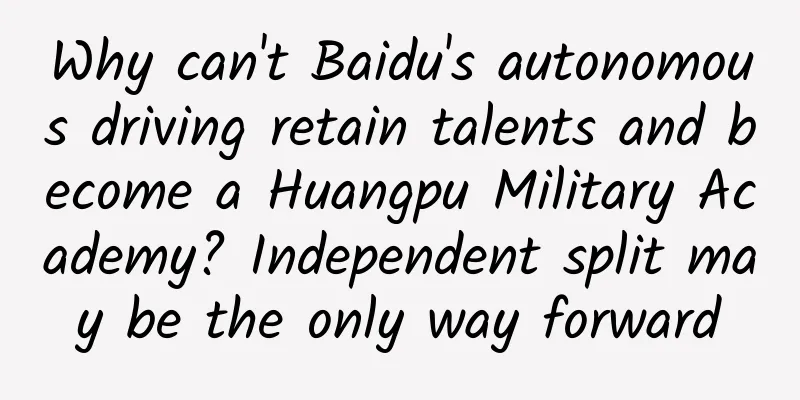Why can't Baidu's autonomous driving retain talents and become a Huangpu Military Academy? Independent split may be the only way forward

|
It can be said that Baidu’s talents support half of China’s autonomous driving industry. In addition to Baidu's own autonomous driving department, many domestic autonomous driving start-ups have deep roots with Baidu. JingChi Technology's Wang Jin, Han Xu, and Chen Shixi all came from Baidu. Horizon Robotics' Yu Kai was the former vice president of Baidu's Deep Learning Institute. Hodo Technology CEO Ni Kai was the former head of Baidu's driverless car team. The founders of Pony.ai, Lingjun Technology, Kuandeng Technology, DeepMap, Innovusion and many other startups all came from Baidu. Baidu can be said to be the Huangpu Military Academy of China's autonomous driving industry, and has made great contributions to the development of China's autonomous driving in terms of talent training. However, for Baidu, it is not a happy thing that so many of its former comrades-in-arms have now become its competitors. The pain of brain drain The biggest impact on Baidu is Lu Qi's departure. At the beginning of last year, Lu Qi joined Baidu as the president and chief operating officer of Baidu Group. Robin Li gave Lu Qi the highest authority second only to himself, hoping that Lu Qi could play the role of a reformer and change Baidu's decline. Lu Qi lived up to expectations. In the more than one year since Lu Qi joined Baidu, Baidu's stock price has risen by nearly 60%. Similarly, it was Lu Qi who called out Baidu's slogan of "All in AI", and Baidu's progress in the field of autonomous driving has also been greatly accelerated. Lu Qi's major adjustments to the original business also indirectly led to a new round of resignations. On March 27, Wang Jin, former senior vice president of Baidu and general manager of the autonomous driving division, resigned. In March and April last year, Hu Yue, general manager of Baidu Tieba Division, Li Dongmin, general manager of Baidu Map Division, and vice president Li Jing also resigned one after another. Lu Qi's sudden departure caused Baidu's stock price to plummet. Fortunately, Baidu did not change its previous investment in AI and autonomous driving. Baidu's stock price has gradually returned to the level before Lu Qi's departure. The inability to retain talent has become a major concern for Baidu. The loss of a large number of key talents is not accidental. The bureaucratic culture within Baidu may be the main reason for the large-scale loss of talent. As early as 2013, Dai Wenyuan, the former head of Baidu's Phoenix Nest system, protested on Weibo that "Baidu's administrative director Zhang Ming occupied five parking spaces." Six months later, Dai Wenyuan resigned from Baidu and joined Huawei. This kind of privileged behavior is only the surface of the bureaucratic culture. What is more serious is the unclear responsibilities and factional struggles. It is said that Baidu's senior executives often have positions that do not match their responsibilities. Although Lu Qi was the president of Baidu Group during his tenure, CFO Yu Zhengjun, who was in charge of finance, and senior vice president Liu Hui, who was in charge of personnel, were not under Lu Qi's management and still reported directly to Robin Li. Li Yanhong's wife Ma Dongmin's position is only "special assistant to the chairman", but she is undoubtedly part of Baidu's power center. Lu Qi's reform measures have undoubtedly touched the interests of Baidu's veterans. Lu Qi's departure was probably due to his helplessness in dealing with such conflicts of interest. In fact, if companies want to retain key talents, first, they must have the money in place; second, they must allow the talents to fully display their talents and not let them suffer any grievances; if they can be motivated by a sense of mission and ideals, they can better unite people. The departure of Baidu's many autonomous driving talents is either due to problems in the division of interests or serious internal friction in the company, which cannot provide a good space for talents to display their talents. Independent split may be a good medicine After Wang Jin left Baidu's autonomous driving division, which he founded, he founded Jingchi Technology and set a new record for the fastest Chinese driverless company with the "Jingchi speed". On the one hand, Jingchi Technology's rapid development is due to standing on the shoulders of the giant Baidu, and on the other hand, it is also the result of getting rid of Baidu's negative factors and giving full play to its own advantages. Wang Jin, who left Baidu, believes that Baidu should separate the autonomous driving project and eventually raise funds and go public independently. In fact, separating the autonomous driving department has become a "common practice" internationally. Google separated its autonomous driving division as early as 2016. Currently, Waymo's autonomous driving has begun to be commercialized on a large scale. In 2016, General Motors acquired Cruise Automation, a startup company that develops autonomous vehicles. GM has always insisted on letting Cruise operate independently. To this day, Cruise still maintains its advantage in the field of autonomous driving. In May this year, Cruise received a large third-party investment of US$2.25 billion from SoftBank Group. In May 2017, automotive parts supplier Delphi announced that it would split its powertrain systems division into two parts, with the new independent companies being named Aptiv and Delphi Technologies. On July 5 this year, Ford established a subsidiary, Ford Autonomous Driving Vehicle Co., Ltd. Ford believes that this can distinguish the autonomous driving business from Ford's original smart mobility company, so as to better absorb third-party investment. Although Baidu's autonomous driving is in a leading position in China, there is still a big gap compared with industry giants such as General Motors and Google. Autonomous driving is an important part of Baidu's future strategy and also Baidu's advantage over Alibaba and Tencent. Although Baidu has announced the successful mass production of L4 driverless buses, it still has a long way to go before large-scale commercial use. Baidu's autonomous driving still requires continuous capital investment and currently relies mainly on transfusions from traditional businesses. Lu Qi has left Baidu, but Baidu's AI and autonomous driving strategies still need to be implemented. Long-term reliance on traditional business transfusions is a heavy burden for traditional businesses. The conflict of interest between the two is bound to affect the progress of traditional autonomous driving business. If Baidu can split its autonomous driving business out independently, it will not only alleviate the conflict with its traditional business, but independent accounting can also better protect the interests of core employees, give autonomous driving talents more room to display their talents, and solve the problem of retaining people. Autonomous driving is a nascent industry that is developing rapidly and requires a high speed of research and development and iteration. If Baidu's autonomous driving department is separated, it will be able to effectively avoid Baidu's old bureaucratic style, make decisions and execute more efficiently, and adapt to the rapid changes in this industry. Cruise receives large investment from SoftBank The independent autonomous driving department will be more convenient in attracting third-party investment, which can not only ease the tight funding situation of the autonomous driving department, but also further reduce the dependence on the old business and alleviate the contradiction between Baidu's new business and old business. The independent autonomous driving department can weaken Baidu's background, further dispel the concerns of cooperating car companies, and further improve the Apollo ecosystem. At present, there is no sign that Baidu will separate its autonomous driving business. Even if Baidu has similar plans, how to divide it and how to coordinate the interests of all parties will be a big challenge. As a winner of Toutiao's Qingyun Plan and Baijiahao's Bai+ Plan, the 2019 Baidu Digital Author of the Year, the Baijiahao's Most Popular Author in the Technology Field, the 2019 Sogou Technology and Culture Author, and the 2021 Baijiahao Quarterly Influential Creator, he has won many awards, including the 2013 Sohu Best Industry Media Person, the 2015 China New Media Entrepreneurship Competition Beijing Third Place, the 2015 Guangmang Experience Award, the 2015 China New Media Entrepreneurship Competition Finals Third Place, and the 2018 Baidu Dynamic Annual Powerful Celebrity. |
Recommend
Powder snow is easy to slide on and doesn’t hurt, but is it more dangerous?
Snow is a fascinating natural phenomenon. Whether...
ASO knowledge that you must know for app promotion (including Android and iOS), ASO optimization strategy
As everyone knows, ASO refers to the search optim...
Baoji mini program development company, how much does a home decoration mini program cost?
How much does it cost to attract investors for Ba...
Information flow ads have no click-through rate? Talk about the routines of advertising creative production
In traditional advertising, there is a famous phe...
4G stimulates operators’ transformation towards the Internet
The half-year financial reports of the three majo...
Short video marketing, save these strategies quickly!
In recent years, with the sharp increase in deman...
Is the battery consumption serious after upgrading to iOS 14.8? Share 10 iPhone power saving settings, applicable to all models
Hello again, I am Dawei. In addition to sharing t...
Level 10 pain! Is “snake around waist” the residual virus of chickenpox?
Let me ask you a question first. Have you ever he...
Can changing your diet really lower your blood pressure? Here’s how to eat to protect your heart
Recently there was a very eye-catching scientific...
Operational activity analysis丨Today’s Toutiao gold coin activity!
The creativity of an event is often an important ...
Imagery in Material Design
[[123978]] In material design, images (whether pa...
A nanny-level guide for beginners to create Tik Tok videos (Part 1)
Today, I will introduce to you some tips on how t...
Swift AsyncThrowingStream and AsyncStream code examples
Preface AsyncThrowingStream and AsyncStream are p...
What is the reason behind the termination of the autonomous driving cooperation between BMW and Baidu?
Recently, according to a report by German Wirtsch...
Office Administration Guide: From a Thankless Job to a Successful Job
Administrative work is not as simple as just doin...









